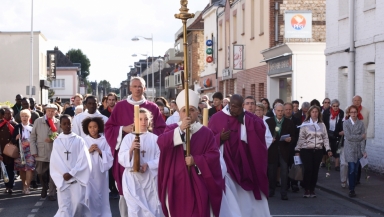
The official process has begun for the beatification of Fr Jacques Hamel, the French priest who was killed by Islamic extremists while celebrating mass at his church in Normandy in July.
The Archdiocese of Rouen officially began an inquiry into making Hamel a saint, after Pope Francis sent a note waiving the traditional five year waiting period.
Rouen's Archbishop Dominique Lebrun made the announcement after celebrating a mass yesterday to re-open the church of Saint-Étienne-du-Rouvray, where Hamel was killed on 26 July.
A special service began with a procession through the town, before Archbishop Lebrun sprinkled holy water in the church as a sign of purification.
The liturgy at yesterday's mass included scripture readings and special prayers focused on themes of forgiveness, reconciliation and peace.
The BBC reported that many Muslims attended the ceremony, which was relayed on a big screen in the town square.
Usually, the Vatican insists on a five-year waiting period after the death of a potential candidate for sainthood, but there have been some exceptions, modern examples of which include St Teresa of Calcutta and St John Paul II.
Yesterday, the French Bishops' Conference issued a statement saying that Lebrun was informed by the Vatican's Congregation for the Causes of Saints that Pope Francis "has dispensed the five year waiting period usually required before starting the official investigation of the beatification."
In order to thank the pope for "this exceptional gesture," Lebrun started the sainthood process yesterday.
Pope Francis had previously declared that Hamel was a martyr during a special mass at the Vatican on 14 September in memory of the priest. Lebrun, Hamel's sister, and about 80 other pilgrims from Rouen were in Rome for the event.

Lebrun asked the pope if he would sign a photograph of Hamel to take to the three nuns who had witnessed the attack but were unable to travel to Rome.
The pope then surprised the archbishop by asking him to place the photo on the altar before the mass. "This struck me," Lebrun said.
"After he greeted everyone, he was signing the photo and told me: you can put this photo in the church because he [Hamel] is blessed now; and if someone tells you that you have no right, you tell them that the pope has given you permission," Lebrun said.
Pope Francis said at the special mass earlier this month: "Father Jacques Hamel has been slaughtered in the Cross, just as he celebrated the sacrifice of the Cross of Christ.
"A good man, meek, a brother, who was always trying to make peace, was assassinated as if he were a criminal."













